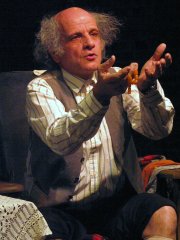
Paulanne Simmons
Painful Memories
 |
| Victor Attar in "Golgotha" |
“Golgotha”
Directed by Geula Jeffet Attar
Presented by La MaMa E.T.C. in association with American Sephardi Federation
with Sephardic House
74A East Fourth St.
Weekdays and Saturdays 8 p.m., Sundays 3:30 & 8 pm
Dec. 14-18 & 20-22
$15/tdf (212) 475-7710
Reviewed by Paulanne Simmons Dec. 18, 2005
As much as historians, philosophers and artists have analyzed and interpreted the Holocaust, there always seems to be some new aspect of that horrific time yet to be explored. “Golgotha,” at La MaMa E.T.C. until Dec. 22, is a revelatory piece in which Albert Salvado, a Greek, Ladino-speaking Jew and Holocaust survivor, bares his soul.
Albert relives the horror of the camps – along with his feelings of anger, shame and guilt – as he gets ready for the annual Holocaust commemoration ceremony at Yad Vashem in Jerusalem, where he will light the torch, an honor for which he feels neither prepared nor worthy.
Golgotha was written by Shmuel Refael, who drew from the experiences of his father and research he conducted in 2001 under a commission from the foreign ministry of Spain. It was adapted by Israeli screenwriter Haim Idissis, translated by Howard Rypp and turned into a multimedia experience (the play includes Greek-Judeo music composed by Yuval Mesner and video art by Dana Levy) by director Geula Jeffet Attar and actor Victor Attar, whose one-man performance is a tour de force not to be missed.
Golgotha, a term that is better known as the name for the site where Jesus was crucified, is an old Ladino term for suffering. The suffering depicted on this stage is painful and overwhelming.
Alberto says he plays hide and seek with the Devil, who visits his room at least once a week and predicts, “Some day he’s gonna catch me.” He remembers how he worked at the ovens twelve hours a day, how he and a friend once feasted on stolen potatoes and cabbage, how he lost his wife and his two daughters. He concludes that, sixty years later, the fire of the crematoriums still burns within his body.
The suffering of Sephardic Jews during the Holocaust was particularly intense due to their isolation in the midst of Ashkenazi, Yiddish-speaking Jews. Yet their plight has always been overshadowed by the more numerous Ashkenazi.
At this, the 60th anniversary of the Holocaust, Golgotha is a powerful reminder that the depth of evil has not yet been plumbed.

| museums | NYTW mail | recordings | coupons | publications | classified |